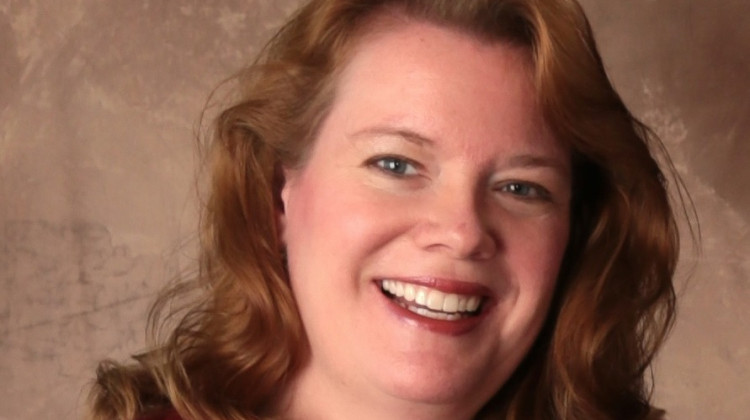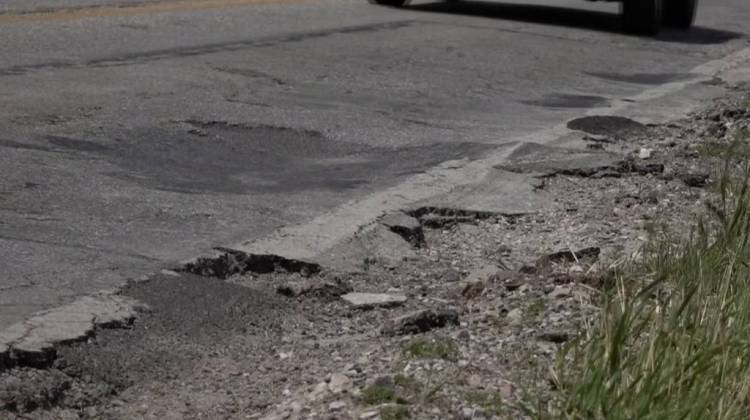
In the city of La Porte, Mayor Blair Milo doesn’t see the quality of Indiana’s roadways as something to brag about.
Drew DaudelinINDIANAPOLIS Gov. Mike Pence often trumpets that state roads are in better condition than most other places in the country.
In reality the data is mixed. In 2010, the state received a C- grade on roads from the American Society of Civil Engineers. That’s better than the national average the group gave the United States a D grade for roads in 2013.
But a recent study commissioned by state lawmakers puts Indiana’s roads in the bottom third of the country.
In the city of La Porte, Mayor Blair Milo doesn’t see the quality of Indiana’s roadways as something to brag about. Milo says for as long as she’s been in office, road conditions have been a problem.
“Any time we’ve been able to do any kind of pavement work over the last four years, it’s been being able to cobble together some funds to be able to address pretty much dire needs,” Milo says.
Being just south of Lake Michigan, low temperatures and heavy snow during winter months don’t bode well for the pavement in La Porte.
And after years of being neglected, the roads are crumbling.
“We had a number of years that no maintenance occurred,” Milo says. “No paving, very little crack sealing even could go on, let alone the kind of reconstruction that really needs to happen on the bulk of our roads.”
It’s a problem lawmakers have largely been punting on for years. They assigned some money in the 2013 budget for state and local road maintenance, but it only covered long overdue maintenance.
Then, this summer, traffic on I-65 near West Lafayette snarled to a halt. A bridge was sinking. INDOT immediately shut down the northbound lanes, while crews worked around the clock to make repairs.
Hoosiers were frustrated and pointed fingers at the state for not putting more money into road maintenance coffers.
Rep. Ed Soliday, R-Valparaiso, is the author of a new House bill he says is years in the making. It includes a four cent gas tax increase, which he says amounts to about $25 more a year for the average Hoosier driver. And the measure also shifts more funds from the sales tax on gas to support infrastructure.
“The sales tax on gasoline, at 7 percent, was paid by people who use the roads. But yet it was going to pay for all kinds of things, education, Medicaid, and actually was building surpluses,” Soliday says.
The House bill includes a $1 increase on the cigarette tax, which would go towards Medicaid. That would replace funds shifted from the sales tax on gas.
And it creates a matching grant program for communities around the state. Cities and counties can use a variety of new and expanded local tax options in the bill to raise funds, which the state will then match.
Milo and other mayors laud the idea.
“We have to look at having different kinds of tools available to us because of the fact that tax caps significantly restrict our abilities in any kind of financial model,” Milo says.
Pence has a plan of his own, already approved by a Senate committee. It uses about a quarter billion dollars from the state’s budget reserves and a quarter billion dollars from bonds to fund state road and bridge maintenance.
In his State of the State address this month, Pence attacked the House Republicans' bill and said he wouldn’t support any plan that included a tax increase.
“I think when you got money in the bank, and you got the best credit rating in America, the last place you should look to pay for roads and bridges is the wallets and the pocketbooks of hard-working Hoosiers,” Pence said.
Soliday argues that getting the amount of money needed for roads, which he estimates to be about $1 billion a year, would require an irresponsible amount of money to be taken out of state reserves.
And critics also argue that Pence’s plan to use bonding as another funding tool is flawed, because the roads would be in disrepair or at least in need of significant maintenance before the state was able to pay off the bonds.
A third plan offered by Senate Republicans aims to help local roads, working in concert with Pence’s state road plan.
The bill’s author Sen. Brandt Hershman, R-Buck Creek, says it differs from the House bill in that it would include no tax increases, and would only create a one-time distribution of funds.
“But it is so much money that’s being distributed that it will probably pay for two to three years worth of transportation funding at the local level,” Hershman says.
Hershman says that plan would serve as a bridge to a long-term solution, and Pence has thrown his support behind it.
Back in La Porte, Milo says to get the city’s roads to an acceptable level will cost around $18 million. Under the Senate bill, the city would receive just over $600,000.
“Half-a-million dollars to you and me seems like a whole lot of money,” Milo says. “In the grand scheme of road projects, it doesn’t go very far.”
But Hershman says he has no problem with the amount of money going out in his bill. Especially, he says, since it exists in addition to local revenue streams from state gas tax funding and local property and income taxes.
“This is just, I would say one time frosting on the cake, but it’s thick frosting,” Hershman says.
The amount of money cities and towns would receive under the Senate bill is based on income tax revenue, which some have posited would give wealthy communities a disproportionate amount. Zionsville, with roughly the same population as La Porte, would receive $3.5 million – almost six times more.
Both the Senate and House bills passed through their first hearings. House Republicans blocked an amendment from Democrats removing the tax increases from their bill.
 DONATE
DONATE









 Support WFYI. We can't do it without you.
Support WFYI. We can't do it without you.